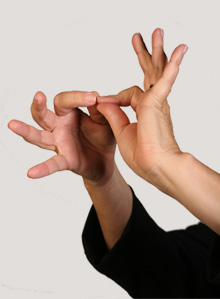
By Matthew Muir | Staff Writer
Baylor Missions hosted a trio of workshops teaching students how to communicate with deaf communities around the world last week in preparation for an upcoming mission trip to Ecuador.
The workshops were presented by Colin Analco from Deaf Missions. Deaf Missions is an organization that brings Christianity to deaf communities around the world. Analco works for the group as an ASLV, or American Sign Language Version, translator and interprets the Bible for American Sign Language. The first workshop took place Thursday.
Analco, who is deaf, instructed the first workshop entirely nonverbally. He demonstrated ways to effectively communicate through the use of sign language, facial expressions, body language and other gestures.
Analco presented a few rules for the workshop designed to promote active participation. He would not accept “I don’t know,” as an answer and always expected a response. He encouraged students to learn from their peers and through their own mistakes. Analco guided participants through a series of activities that taught them how to use a full range of movement, expressions and sign language to communicate nonverbally. Students practiced with words ranging from those as simple as furniture and animals to more complex ideas and phrases like Spiderman swinging from building to building and a sunset over the ocean.
Holly Tate, the assistant director of student engagement for Baylor Missions, wanted the workshop to help students reach out to deaf communities.
“We want to provide educational opportunities for students to think about how to interact in different cross-cultural settings and a lot of times there are some communities that get overlooked,” Tate said. “We think a lot about ‘oh what does it mean to interact with someone who speaks Spanish,’ [but there are] other languages that we don’t always think about.”
Sophomore Tisa Berry, a child and family studies major from Lawton, Oklahoma, came to the workshop hoping to learn how to better communicate across nonverbal language barriers. She said the workshop lived up to her expectations.
“I was definitely expecting to learn some methods of nonverbal communication, especially if you don’t know [someone’s] sign language,” Berry said. “I definitely did learn methods of nonverbal communication, describing things in a way that you’d be able to communicate with someone without actually having to use a sign.”
Berry is one of roughly a dozen students who will be part of a mission trip to Ecuador in May. Baylor Missions will work with a deaf community in Ecuador tutoring children, hosting Bible clubs and performing other educational tasks.
“This is the first year we’ve had a deaf education mission trip in a long time,” Tate said. “This is an opportunity to provide training for them specifically, but also to open it up to any students who are interested in learning more about interacting with the deaf community.”
Baylor Missions’ second open workshop on Friday continued to focus on cross-language communication. The third workshop on Saturday morning was a closed session for students traveling on the Ecuador mission trip and had an emphasis on Ecuadorian Sign Language.





